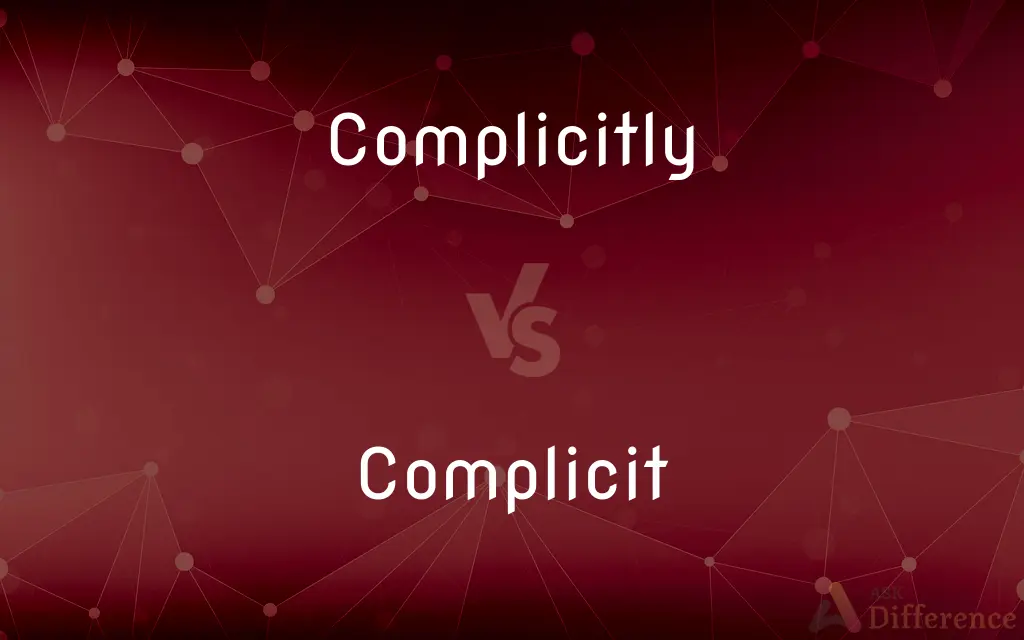Complicitly vs. Complicit — What's the Difference?
By Fiza Rafique & Maham Liaqat — Updated on May 2, 2024
Complicitly refers to an adverb describing how someone is involved in wrongdoing, while complicit is an adjective describing someone involved in or responsible for wrongful acts.

Difference Between Complicitly and Complicit
Table of Contents
ADVERTISEMENT
Key Differences
Complicitly is used to describe the manner in which someone participates in a negative action or behavior, often highlighting their silent or indirect involvement. Whereas, complicit directly describes a person or entity as being involved in or responsible for a wrongdoing, without specifying the manner or extent of involvement.
When describing someone's involvement in a questionable act, complicitly serves to detail the method or attitude of participation. On the other hand, complicit is used to attribute the state of being involved, focusing more on the state or condition rather than the action.
In legal or moral discussions, complicitly might be used to enhance the description of how a party is involved, suggesting a subtle or passive role. While, complicit often carries a straightforward accusation or implication of guilt.
Complicitly could be used in narrative to enrich the context, giving depth to a character’s engagement in activities considered unethical. In contrast, complicit typically labels a character directly, potentially influencing the audience’s perception of that character from that point forward.
In media reports, using complicitly can suggest a nuanced involvement, perhaps where the full extent or nature of participation is not known. Whereas, using complicit can serve as a definitive statement of involvement, often used to assert accountability or blame.
ADVERTISEMENT
Comparison Chart
Part of Speech
Adverb
Adjective
Usage
Describes how involvement is carried out
Describes the state of being involved
Contextual Focus
Method or manner of involvement
Direct involvement or responsibility
Implication in Text
Suggests a subtle or indirect involvement
Direct accusation or implication of guilt
Common Usage in Media
Less direct, nuanced
More direct, often accusatory
Compare with Definitions
Complicitly
Involvement by omission in a questionable activity.
They complicitly allowed the misinformation to spread.
Complicit
Implies a direct or active role in unethical activities.
The officials were complicit in hiding the evidence.
Complicitly
Contributing to a wrongful act through passive approval.
He complicitly watched the theft.
Complicit
Bearing responsibility as part of a group involved in misconduct.
They were complicit in the cover-up.
Complicitly
Acting in a way that facilitates unethical behavior without direct involvement.
She complicitly benefited from the corruption.
Complicit
Used to describe someone as a co-conspirator.
She was found to be complicit in the conspiracy.
Complicitly
Serving as an indirect participant in wrongful acts.
He complicitly ignored the rules, pretending not to see.
Complicit
Attributed with shared guilt in illegal activities.
He is complicit in the crime.
Complicitly
Enhancing a narrative of wrongdoing by subtle support.
She acted complicitly, offering silent consent.
Complicit
Involved in or responsible for a wrongdoing.
He was complicit in the fraud scheme.
Complicitly
In a complicit manner.
Complicit
Involved with others in an activity that is unlawful or morally wrong
The careers of those complicit in the cover-up were blighted
Complicit
Associated with or participating in a questionable act or a crime; having complicity
"Presidential handlers and a complicit press corps managed to suppress public awareness" (Andrew P.N. Erdmann).
Complicit
Associated with or participating in an activity, especially one of a questionable nature.
Common Curiosities
What does complicit mean?
Complicit is an adjective describing someone directly involved in or responsible for a wrongful act.
Can a company be described as complicit?
Yes, a company can be described as complicit if it is involved in or responsible for unethical practices.
How do you use complicitly in a sentence?
You can use complicitly to describe the manner of someone’s involvement, such as "He was complicitly involved by not taking action."
Is complicitly a common English word?
Complicitly is less common than complicit and is more specific in describing the manner of involvement.
What does complicitly mean?
Complicitly refers to acting in a way that subtly or indirectly contributes to wrongdoing.
Can complicitly have a positive connotation?
Typically, complicitly has a negative connotation, relating to involvement in negative actions.
What's an example of using complicit in corporate contexts?
In corporate contexts, a company might be described as complicit in environmental damage if it knowingly violates regulations.
What is the noun form of complicit?
The noun form is complicity, which refers to the state of being complicit.
Can one be unintentionally complicit?
Yes, one can be unintentionally complicit if they are unknowingly involved in or contribute to wrongdoing.
Is it correct to say someone is "very complicit"?
Yes, saying someone is "very complicit" emphasizes their significant involvement in wrongdoing.
What is the difference between being complicit and acting complicitly?
Being complicit refers to the state of involvement, whereas acting complicitly focuses on the manner of involvement.
How does the media typically use the term complicit?
The media often uses the term complicit to accuse or expose those involved in scandals or unethical behavior.
Does complicitly always imply illegal activities?
Not necessarily; complicitly can refer to involvement in any unethical or immoral actions, not just illegal ones.
Can the use of complicitly affect legal judgments?
The use of complicitly in legal contexts can affect interpretations of a person's level of involvement or guilt.
What synonyms can be used for complicit and complicitly?
Synonyms for complicit include involved, culpable, and responsible; for complicitly, indirectly involved or tacitly.
Share Your Discovery

Previous Comparison
Deep vs. Abyss
Next Comparison
Jah vs. JesusAuthor Spotlight
Written by
Fiza RafiqueFiza Rafique is a skilled content writer at AskDifference.com, where she meticulously refines and enhances written pieces. Drawing from her vast editorial expertise, Fiza ensures clarity, accuracy, and precision in every article. Passionate about language, she continually seeks to elevate the quality of content for readers worldwide.
Co-written by
Maham Liaqat















































